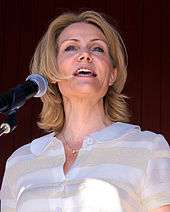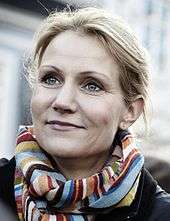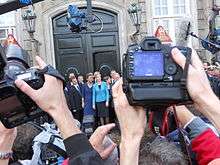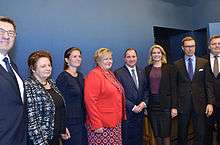Helle Thorning-Schmidt
| Helle Thorning-Schmidt | |
|---|---|
.jpg) | |
| Prime Minister of Denmark | |
|
In office 3 October 2011 – 28 June 2015 | |
| Monarch | Margrethe II |
| Deputy |
Margrethe Vestager Morten Østergaard |
| Preceded by | Lars Løkke Rasmussen |
| Succeeded by | Lars Løkke Rasmussen |
| Leader of the Opposition | |
|
In office 12 April 2005 – 3 October 2011 | |
| Prime Minister |
Anders Fogh Rasmussen Lars Løkke Rasmussen |
| Preceded by | Mogens Lykketoft |
| Succeeded by | Lars Løkke Rasmussen |
| Leader of the Social Democrats | |
|
In office 12 April 2005 – 28 June 2015 | |
| Deputy |
Frank Jensen Mogens Jensen |
| Preceded by | Mogens Lykketoft |
| Succeeded by | Mette Frederiksen |
| Personal details | |
| Born |
14 December 1966 Copenhagen, Denmark |
| Political party | Social Democrats |
| Spouse(s) | Stephen Kinnock (m. 1996) |
| Children | 2 |
| Alma mater |
University of Copenhagen College of Europe |
| Signature |
|
Helle Thorning-Schmidt (Danish pronunciation: [hɛlə ˈtˢoɐ̯neŋ ˈsmed̥]; born 14 December 1966)[1] is a former Danish politician who was Prime Minister of Denmark from 2011 to 2015, and the Leader of the Social Democrats from 2005 to 2015. She is the first woman to hold either post. Following defeat in 2015, she announced that she would step down as both Danish Prime Minister and Social Democratic party leader. Ending her political career in April 2016, she is the chief executive of the NGO Save the Children.[2]
Thorning-Schmidt served as a Member of the European Parliament for Denmark from 1999 to 2004 before being elected to the Danish Parliament in 2005. She was elected to replace Mogens Lykketoft as Leader of the Social Democrats after the 2005 parliamentary election, leading her party through the 2007 parliamentary election, which was won by the centre-right alliance, and the 2011 parliamentary election, after which she was appointed Prime Minister by Queen Margrethe II. Thorning-Schmidt holds degrees in political science from the University of Copenhagen and a graduate degree from the College of Europe.[1]
Early life and education
Helle Thorning-Schmidt was born in Rødovre to Holger Thorning-Schmidt, a lecturer in mathematics and national economics at the University of Copenhagen, and his wife Grete. Her father was politically conservative[3] and she grew up in the Copenhagen suburb of Ishøj. She attended Ishøj Gymnasium from which she graduated in 1985. Her parents divorced when she was 10 years old.[4]
Thorning-Schmidt studied political science at University of Copenhagen, earning a cand.scient.pol. degree in 1994. She also holds a master's degree in European studies specialising in policy and public administration from the College of Europe in Bruges, Belgium, where she studied from 1992 to 1993 (she is an alumna of the Charles IV promotion).[5] At the time, Denmark had a quota administered by the Ministry of Foreign Affairs of one student at this prestigious institution, and Thorning-Schmidt was selected.[6] In addition to her native Danish, she speaks fluent English and French.
She became a social democrat during her studies in Belgium and joined the Social Democratic Party in 1993.[7]
Early career in the European Parliament
From 1994 to 1997, Thorning-Schmidt led the secretariat of the Danish delegation of Social Democrats in the European Parliament.[1] After her time in Brussels she worked as an international consultant with the Danish Confederation of Trade Unions until being elected MEP in 1999.[1]
Thorning-Schmidt was elected to the European Parliament as a member of the Party of European Socialists. During the five-year term, she was a member of the Employment and Social Committee and served as a substitute on the Constitutional Committee.[8] She co-founded the Campaign for Parliament Reform (CPR).[9]
Member of the Folketing
In the 2005 Danish parliamentary election Thorning-Schmidt was elected to the Folketing.[1]
Leader of the Social Democrats

After the defeat in the 2005 election, in which the Social Democrats lost five seats and failed to regain the majority it had lost in the 2001 election, former Minister of Finance and party leader Mogens Lykketoft resigned his post, taking responsibility for the poor election results. In his speech of resignation on election night, 8 February 2005, he called for a leadership election in order to determine who should lead the party into the next election.[10]
Thorning-Schmidt campaigned for the party leadership as a moderate candidate and was elected by the party members on 12 April 2005, ahead of the other candidate, Frank Jensen. She led the Social Democrats in the 2007 election, in which her party suffered modest losses and was forced into a third term in opposition. The party was also unable to regain its position as the largest party in the Folketing.[11]
She was against holding a referendum on the European Reform Treaty.[12] During her 2007 campaign she promised to relax restrictions on asylum seekers and immigrants.[13] She also opposed tax cuts announced by Anders Fogh Rasmussen, instead stating she would like to see more funding for welfare. The party also campaigned on a platform of combating increased inequalities in society, and fighting global warming by supplying 45% of Denmark's energy from renewable sources by 2025.[14]
Although her party again lost two seats in the 2007 election reducing the total to 45 seats, her leadership was not questioned by her party.[15] In June 2008, according to a Gallup poll, the opposition centre-left was at 49.8% compared to 49.6% for the centre-right. This would leave the centre-left with 88 seats, two short of a majority, discounting the Faroe Island and Greenland seats.[16] Since late 2009 the opposition enjoyed large majorities in the polls, and according to polls carried out in January 2011 the opposition led the governing coalition under Lars Løkke Rasmussen by 5–7 points and the Social Democrats led Venstre by 7–10 points which would make the Social Democrats the largest party by far in the Folketing.[17]

Both Margrethe Vestager (Social Liberal Party) and Villy Søvndal (Socialist People's Party) have pledged their support to Thorning-Schmidt after a potential election victory.[18] After the last election Helle Thorning-Schmidt started working towards forming a centre-left government coalition consisting of the Socialist People's Party and the Social Liberal Party with parliamentary support from the small Red-Green Alliance.[19][20] As the leader of the largest opposition party in Denmark, she was described by the media as the leader of the Danish opposition.[21]
Appointment as Prime Minister
In the 2011 parliamentary election, she was re-elected to parliament. Although the ruling Liberal Party became the largest party and gained a seat and the Social Democrats lost a seat, the opposition parties combined obtained more seats than the government coalition. Her four-party bloc gained a majority of 89 seats in the 179-seat parliament against 86 for the sitting Prime Minister and his center-right parliamentary supporters. Prime Minister Lars Løkke Rasmussen formally tendered his resignation to Queen Margrethe on 16 September 2011. Rasmussen's cabinet remained in office as a caretaker government[22] until 3 October, when Helle Thorning-Schmidt was appointed Prime Minister by the Queen following negotiations with the other opposition parties.
Prime Minister of Denmark

First Cabinet
Helle Thorning-Schmidt officially began her first term as Prime Minister on 3 October 2011, after having presented her cabinet to the Queen and having received her official appointment.[23] Thorning-Schmidt has pursued a centrist compromise agenda, building several reforms with support from both sides of the Folketing. This has caused friction with the supporting Red-Green Alliance, which has been kept outside of influence.[24]
Thorning-Schmidt presided over the successful conclusion of NATO's strike missions in Libya, to which Denmark was a contributor, less than three weeks after taking office.[25]
During the first year in office her government rolled back anti-immigration legislation enacted by the previous government,[26] and passed a tax-reform with support from the liberal-conservative opposition.[27] The tax reform raised the top tax threshold, effectively lowering tax rates for high income earners.[28] The aim of the tax reform has been to increase labour output to fend off a projected shortage within the next decades. The stated goal is to entice Danes to work more in order to compensate for the decreasing workforce, by lowering tax on wages and gradually lowering welfare payments to those outside of the labour market to increase the economic benefit of working relative to receiving welfare.[29]
On 9 August and 12 December 2013, amid tensions between coalition partners, Thorning-Schmidt made cabinet reshuffles.
Second Cabinet

On 30 January 2014, the Socialist People's Party announced their departure from Thorning-Schmidt's government due to a conflict over the proposed sale of DONG Energy shares to Goldman Sachs. Before departure, they also announced they will support Thorning-Schmidt although not being a part of her government.[30]
Thorning-Schmidt led her party into the 2015 general election in which her party increased its share of votes and seats, but the left bloc was defeated by the right bloc. She announced her resignation as Prime Minister of Denmark and as leader of the Social Democrats after the election results became clear.
Electoral history
Thorning has been leader of the Social Democrats through seven electoral campaigns.[31]
| Year | Type | Votes | % | Change in % | Seats | Change in Seats |
|---|---|---|---|---|---|---|
| 2005 | Local | 986,829 | 34.3 | +1.5 | 900 | n/a |
| 2007 | General | 881,037 | 25.5 | −0.3 | 45 | −2 |
| 2009 | European | 503,439 | 21.5 | −11.1 | 4 | −1 |
| 2009 | Local | 853,221 | 30.6 | −4.9 | 801 | −99 |
| 2011 | General | 879,615 | 24,8 | −0.7 | 44 | −1 |
| 2013 | Local | 919,574 | 29.5 | −0.9 | 773 | −28 |
| 2014 | European | 435,245 | 19.1 | −2.4 | 3 | −1 |
| 2015 | General | 925,635 | 26.3 | +1.5 | 47 | +3 |
Life after politics
Since her retirement from Danish politics, Thorning-Schmidt has held paid and unpaid positions, including:
- International Commission on Financing Global Education Opportunity (led by Gordon Brown), Member (since 2015)[32]
- United Nations High-level Advisory Group for Every Woman Every Child, Member (since 2016)[33][34]
- Save the Children, C.E.O. (since 2016)
- International Crisis Group, Member of the Board of Trustees (since 2016)[35]
- Scaling Up Nutrition Movement, Member of the Lead Group (since 2016, appointed by United Nations Secretary-General Ban Ki-moon)[36]
- European Council on Foreign Relations (ECFR), Member[37]
Personal life
She married Stephen Kinnock (who became a British MP in 2015) in 1996, so becoming the daughter-in-law of Neil Kinnock, former leader of the British Labour Party and European Commissioner, and Glenys Kinnock, former British Minister for Europe. She met her husband while they were both attending the College of Europe. They have two daughters, Johanna and Camilla. Helle lives in Copenhagen with their children, while her husband partly resided in Davos, Switzerland, where he worked as a director for the World Economic Forum.[38] In 2014 he worked for London-based Xyntéo as managing director for the "Global Leadership and Technology Exchange",[39] but he was elected Member of Parliament (MP) for Aberavon at the United Kingdom general election, 2015.
Having lost the Danish general election of 2015, she stepped down as Prime Minister and as leader of the Social Democratic Party. It was announced that Thorning-Schmidt would become her party's member of the Presidium of the Folketing and she currently serves as the Presidium's 1st Vice-President. On 4 September 2015, Prime Minister Lars Løkke Rasmussen announced that the Danish government has nominated Thorning-Schmidt as Denmark’s official candidate to the position as new United Nations High Commissioner for Refugees.[40]
Religious beliefs
Although Thorning-Schmidt has been baptized, she is not confirmed. She occasionally goes to church and does not believe in eternal life, salvation, heaven, or hell.[41][42]
Tax affairs
The Danish tax authorities (SKAT) investigated reports that Thorning-Schmidt's husband, Stephen Kinnock, was guilty of tax evasion. Kinnock had declared that he was not a resident of Denmark and thus not subject to Danish taxes, while at the same time Thorning-Schmidt had declared, in an application for dispensation for Kinnock to own property in Denmark, that he resided in Denmark "every weekend of the year from Friday through to Monday".[43] Thorning-Schmidt attributed the discrepancy to a "big and sloppy error".[43] On 16 September 2010, Danish tax authorities acquitted the couple and the charges of tax evasion were dropped.[44]
A week before the 15 September 2011 elections to the Danish Parliament, the 2010 decision from SKAT (the taxation department) surfaced in the Danish tabloid B.T. The case had been leaked to the newspaper several months previously. It turned out that from 2000 to 2008 Thorning-Schmidt had made use of tax deductions applicable to her husband, even though he was not subject to Danish taxes and had no income in Denmark. The mistake was corrected by SKAT for the three years from 2006 to 2008, and Thorning-Schmidt paid the amount she had saved due to the error. She was however not required to pay the amounts saved for the six years from 2000 to 2005, because of the statutory time limit for liability in such cases.[45]
In November 2011 the daily Politiken disclosed that Tax Ministry deputy chief Peter Loft had attended several meetings attending to the Thorning-Schmidt case and had tried to insert comments into the final resolution text. This would be unlawful under Danish law as the Tax Ministry may not interfere with the decisions taken in individual tax cases.[46] This set off a flurry of speculation in the press, as to whether there had been any political pressure from the then government to pursue a stricter course in the tax case. Tax Minister in the new government Thor Möger Pedersen subsequently asked Peter Loft and the director of the revenue service's Copenhagen branch, Erling Andersen, to give a report on the happenings. On 2 December, Pedersen disclosed that he had found such big discrepancies in the two reports that he would set up a commission of inquiry to determine the actual course of events.[47]
Further controversy erupted when two days later the tabloid daily, Ekstra Bladet, reported that they had also been offered the confidential information that was made public during the election campaign. The source of the leak was determined to be Peter Arnfeldt, spin doctor for then Minister for Taxation Troels Lund Poulsen.[48] This led to intense media speculation that the former government, and specifically Troels Lund Poulsen, were engaged in leaking confidential tax information and trying to pressure the revenue service into changing its decision in the case, in an active attempt to discredit the opposition leader in the then imminent election. This would constitute a hitherto unseen level of abuse of power in Danish political life. The commission of inquiry that had already been announced two days previously, was broadly supported by the Danish Parliament to also look into whether the former government was involved in, or knew of, the leak.[49] On the same day Troels Lund Poulsen announced he would be taking an indefinite leave of absence from the Danish Parliament. Peter Arnfeldt has been reported to the police by the Ministry for Taxation. In March 2012 Peter Loft was suspended from his post as deputy chief, for the duration of the two-year investigation period.[50]
Selfie controversy
In December 2013, Thorning-Schmidt, British Prime Minister David Cameron and US President Barack Obama faced criticism on social media that they had behaved inappropriately after posing for a "selfie" taken with Thorning-Schmidt's mobile phone during the memorial service for the former South African President Nelson Mandela.[51][52] Defending her actions, Thorning-Schmidt said, "There were lots of pictures taken that day, and I just thought it was a bit fun. Maybe it also shows that when we meet heads of state and government, we too are just people who have fun."[52] Cameron said he was being polite when Thorning-Schmidt asked him to take part in the picture. On a previous occasion, Thorning-Schmidt had stopped her car to ask for a picture with the actress Sarah Jessica Parker after spotting her signing autographs in Oslo.[53]
References
- 1 2 3 4 5 "Folketinget – Helle Thorning-Schmidt (S)". ft.dk. Retrieved 17 September 2011.
- ↑ https://www.savethechildren.net/article/former-danish-prime-minister-helle-thorning-schmidt-appointed-lead-save-children
- ↑ "Profil: Helle Thorning-Schmidt – VG Nett om Danmark". Vg.no. Retrieved 16 September 2011.
- ↑ "Helle Thorning har mistet sin far". Vejle Amts Folkeblad. 25 January 2010. Retrieved 16 September 2011.
- ↑ Dieter Mahncke, Léonce Bekemans, Robert Picht, The College of Europe. Fifty years of service to Europe, College of Europe, Bruges, 1999. ISBN 9080498319
- ↑ Olav Hergel. "Portræt: Helle Thorning-Schmidt, Den Første af Danmark cc". Politiken. Retrieved 17 September 2011.
- ↑ "Det bliver i hvert fald en moderne velfærdsdansker". information. Retrieved 16 September 2011.
- ↑ "Helle Thorning-Schmidt", European Parliament. Retrieved 24 October 2011.
- ↑ Nick Clegg and Michiel van Hulten, "Reforming the European Parliament". Retrieved 24 October 2011.
- ↑ "Tale efter Folketingsvalget 2005", Danske taler. (Danish). Retrieved 24 October 2011.
- ↑ "Helle Thorning-Schmidt", Den Store Danske. (Danish). Retrieved 24 October 2011.
- ↑ Denmark announces snap elections, BBC News 24 October 2007
- ↑ Danes in poll tussle over migrants, BBC News 13 November 2007
- ↑ Denmark: A political guide, The Guardian 9 November 2007
- ↑ Munk, Andreas. "Helle Thorning – en socialt anlagt slider", DR, 2 October 2011. (Danish). Retrieved 24 October 2011.
- ↑ Oppositionen går på ferie med flertal "Oppositionen gaar på ferie med flertal", Berlingske, 28 June 2008, (Danish). Retrieved 24 October 2011.
- ↑ "Vælgerne straffer Pia Kjærsgaard". Borsen.dk. 21 January 2011. Retrieved 16 September 2011.
- ↑ "Vestager peger på Helle Thorning". Borsen.dk. 20 October 2008. Retrieved 16 September 2011.
- ↑ "Rød dominans – Politik" (in Danish). BT.dk. Retrieved 16 September 2011.
- ↑ "Greens: Markant rødt flertal – dr.dk/Nyheder/Politik". Dr.dk. Retrieved 16 September 2011.
- ↑ "Danish opposition wins vote, delivering first woman PM | Deccan Herald". Deccanherald.com. 16 September 2011.
- ↑ Marie Hjortdal. "Løkke går af – nu begynder spillet om magten" (in Danish). Politiken.dk. Retrieved 16 September 2011.
- ↑ "Appointment of New Government in Denmark", Embassy of Denmark Lithuania. Retrieved 24 October 2011.
- ↑ Weaver, Ray (18 May 2012). "Government on track but off message". The Copenhagen Post. Retrieved 22 September 2012.
- ↑ "NATO: to decide Friday to end the aerial campaign over Libya, diplomats say". The Washington Post. 20 October 2011. Retrieved 21 October 2011.
- ↑ Adams, William Lee (6 October 2011). "A Blow to Europe's Far-Right: Denmark Reshapes Its Immigration Policies". Time. TimeWorld. Retrieved 20 September 2012./
- ↑ Stanners, Peter (25 June 2012). "Government defends tax deal with opposition". The Copenhagen Post. Retrieved 20 September 2012.
- ↑ "PM supports call to raise top tax threshold". The Copenhagen Post. PS. 16 May 2012. Retrieved 22 September 2012.
- ↑ Preisler, Marie (6 October 2011). "Helle Thorning-Schmidt: Danes must work more". Nordic Labour Journal. Work Research Institute. Retrieved 22 September 2012.
- ↑ "SF leaves government, Vilhelmsen steps down". The Copenhagen Post. 30 January 2014. Retrieved 30 January 2014.
- ↑ "Population and Elections". StatBank Denmark. Retrieved September 27, 2014.
- ↑ Gordon Brown appointed Chair of Education Financing Commission Office of Gordon and Sarah Brown, press release of 22 September 2015.
- ↑ UN Secretary-General Announces Members of the High-Level Advisory Group for Every Woman Every Child Every Woman Every Child, press release of 21 January 2016.
- ↑ "High-Level Advisory Group on Every Woman Every Child". Retrieved 4 September 2016.
- ↑ Crisis Group Announces New Board Members International Crisis Group, press release of 28 July 2016.
- ↑ Secretary-General Appoints 29 Global Leaders to Spearhead Fight against Malnutrition United Nations, press release of 21 September 2016.
- ↑ Members European Council on Foreign Relations.
- ↑ "BBC News – Profile: Danish PM-elect Helle Thorning-Schmidt". Bbc.co.uk. 3 August 2010. Retrieved 17 September 2011.
- ↑ "Stephen Kinnock".
- ↑ "Denmark nominates Mrs. Helle Thorning-Schmidt to the position as new UN High Commissioner for Refugees". http://um.dk/. Retrieved 7 September 2015. External link in
|publisher=(help) - ↑ Kabir Chibber, Jason Karaian (28 January 2015). "These are the religious beliefs of Europe's leaders—including the atheists". Quartz. Retrieved 31 January 2015.
- ↑ Hansen, Mette Skov (14 September 2011). "Helle Thorning-Schmidt om tro og liv efter døden" [Helle Thorning-Schmidt on faith and life after death] (in Danish). Retrieved 31 January 2015.
- 1 2 Danish politics rocked over Kinnock tax status, BBC News 3 August 2010
- ↑ Revisor: Skat frikender Thorning i skattesag, Politiken 16 September 2010 (Danish)
- ↑ Thorning fik uberettiget fradrag i seks år, B.T. 17 September 2011
- ↑ Ministers højre hånd skrev afsnit i Thorning-sag, Politiken 11 November 2011
- ↑ Kommission skal kulegrave skattesag, DR 2 December 2011
- ↑ Avis: Troels Lunds spindoktor ville lække Thornings skattepapirer, Politiken 4 December 2011 (Danish)
- ↑ Undersøgelseskommissionen ventes klar hurtigt, Politiken 5 December 2011
- ↑ Skatteminister fritager sin departementschef fra tjeneste, Politiken. 21 March 2012 (Danish)
- ↑ "Obama and Cameron criticised for memorial 'selfie'". RTÉ News. RTÉ. 10 December 2013. Retrieved 13 December 2013.
- 1 2 Dominiczak, Peter (12 December 2013). "Nelson Mandela: Helle Thorning-Schmidt defends David Cameron 'selfie'". The Daily Telegraph. Retrieved 13 December 2013.
- ↑ Mason, Rowena; Harding, Luke (11 December 2013). "David Cameron and Danish PM brush off criticism of Mandela memorial selfie". The Guardian. Retrieved 13 December 2013.
External links
| Wikimedia Commons has media related to Helle Thorning-Schmidt. |
| Wikinews has related news: Denmark elects new centre-left coalition and prime minister |
- Prime Minister's website (English)
- Helle Thorning-Schmidt at DMOZ (Danish)
| Party political offices | ||
|---|---|---|
| Preceded by Mogens Lykketoft |
Leader of the Social Democrats 2005–2015 |
Succeeded by Mette Frederiksen |
| Political offices | ||
| Preceded by Lars Løkke Rasmussen |
Prime Minister of Denmark 2011–2015 |
Succeeded by Lars Løkke Rasmussen |
| Academic offices | ||
| Preceded by Giorgio Napolitano |
Invocation Speaker of the College of Europe 2012 |
Succeeded by Íñigo Méndez de Vigo |

.jpg)